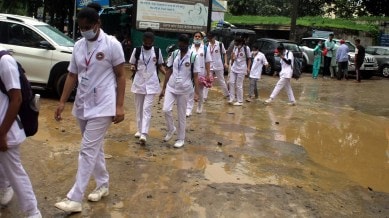Anonna Dutt is a Principal Correspondent who writes primarily on health at the Indian Express. She reports on myriad topics ranging from the growing burden of non-communicable diseases such as diabetes and hypertension to the problems with pervasive infectious conditions. She reported on the government’s management of the Covid-19 pandemic and closely followed the vaccination programme. Her stories have resulted in the city government investing in high-end tests for the poor and acknowledging errors in their official reports. Dutt also takes a keen interest in the country’s space programme and has written on key missions like Chandrayaan 2 and 3, Aditya L1, and Gaganyaan. She was among the first batch of eleven media fellows with RBM Partnership to End Malaria. She was also selected to participate in the short-term programme on early childhood reporting at Columbia University’s Dart Centre. Dutt has a Bachelor’s Degree from the Symbiosis Institute of Media and Communication, Pune and a PG Diploma from the Asian College of Journalism, Chennai. She started her reporting career with the Hindustan Times. When not at work, she tries to appease the Duolingo owl with her French skills and sometimes takes to the dance floor. ... Read More
NMC defers decision on MBBS seat cap amidst strong opposition from states
Pushed into a corner by southern states rendered ineligible to increase their seat capacity, here's why the medical education regulator has taken a step back until further stakeholder consultations take place

Three months after its announcement, the National Medical Commission (NMC), the country’s apex medical education regulator, has suspended its decision to limit the number of MBBS seats to 100 per 10 lakh population in every state — a move that would have otherwise barred all five southern states from increasing their medical seat capacity for the next academic session (2024-25).
The development, announced by the NMC on Wednesday, follows strong opposition from states like Tamil Nadu and Karnataka, and the Union territory of Puducherry against the new regulation notified on August 16.
monthly limit of free stories.
with an Express account.
The regulation — titled “Guidelines for undergraduate courses under the establishment of new medical institutions, starting new medical courses, increase of seats for existing courses, and assessment and rating Regulation 2023” – states that approval for new medical colleges and an increase in the number of MBBS seats from the next academic session would be based on the seats-to-population ratio. It basically caps the number of undergraduate medical seats in a state to 100 per 10 lakh population.
This provision is now in abeyance and will only be implemented for the 2025-26 academic year, after further stakeholder consultations happen, and until consensus can be developed on the matter. According to sources, the Health Ministry asked the NMC to reconsider the move amidst strong opposition from some states.
This is among a slew of decisions the NMC has either put in abeyance or rolled back recently following opposition by stakeholders. Only two-and-a-half months ago, it put on hold its new guidelines that made it mandatory for doctors to prescribe only generic drugs, following backlash from the country’s largest doctors’ body, the Indian Medical Association (IMA), as well as the Indian Pharmaceutical Alliance (IPA), which described the move as “not feasible”.
The prescribed limit of 100 seats per 10 lakh population would have allowed addition of 40,000 more seats, but only in states like Bihar and Jharkhand, where there is over 70% deficiency. This led to a backlash from states that have already exceeded the seats-to-population ratio, including all five southern states.
The rationale behind capping the total seats to 100 per 10 lakh population, according to people in the know, was to ensure equitable distribution of resources, especially faculty members, across the country. This restriction would have allowed the addition of 40,000 more MBBS seats, but only in states such as Bihar and Jharkhand, where there is over 70% deficiency as per the new seats-to-population ratio norm. This is what triggered a backlash from states that have already exceeded this ratio, leaving them ineligible for further expansion.
According to data analysed by The Indian Express, at least 13 states and UTs, including all five southern states of Tamil Nadu, Andhra Pradesh, Telangana, Karnataka and Kerala, have more than 100 seats per 10 lakh population. The new NMC norm would have directly affected them.
Reacting sharply to the potential impact of the new NMC norm, Tamil Nadu Chief Minister M K Stalin had said that it amounted to “direct encroachment” on state rights by the Centre and disproportionately penalised states which have invested heavily in public health infrastructure. With 11,225 seats, Tamil Nadu has the highest number of undergraduate medical seats in the country, exceeding the cap by 46%; as per the NMC’s seats-to-population ratio, it should have 7,686 seats.
Karnataka Minister of Medical Education, Sharan Prakash Patil, had said the move would affect medical education in the state as the government had plans to set up more institutions. He had said the stakeholders weren’t consulted on the move. Karnataka has 11,020 MBBS seats as opposed to the desired limit of 6,769.
Senior officials from Telangana and Karnataka said suspension of the decision would help the government to set up at least one medical college in each district.
In Telangana, there are at least eight districts that don’t have any medical college. Inspections by the medical education regulator for colleges in these districts are scheduled for December, said a senior official from the state.
An official from Karnataka said at least 11 districts don’t have a government medical college. “Our feasibility and essentiality certificates, required to be submitted when applying for new colleges, said the required doctor-patient ratio has not been reached in rural areas. We want children from these districts to study medicine at government colleges and provide specialty care to their communities,” said the official.